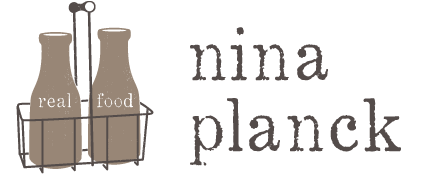Fat Skeptics
11/28/07
Julian turned one in October. Last weekend, we went to London - his first time there outside the womb - to look in on my farmers' markets and enjoy the exquisite raw Guernsey milk and cream one of our Somerset dairy farmers sells. In Konstam, a new local-foods pub near King's Cross, Julian had his first ox tongue. Tender! But mostly he nursed on this trip. Julian also used his potty all over: on the plane, at baggage claim, in the car. When it works - that's most of the time, but not all the time - the potty sure beats cleaning up diapers.
Uffe Ravnskov is a leader of a loose international network of doctors, scientists, and researchers known as The Cholesterol Skeptics. On November 25, 2007, Ravnskov, who is the the author of a terrific and admirably brief book called The Cholesterol Myths, wrote this note.
'An interesting discussion between Gary Taubes and Ronald Krauss aired on November 2 (Talk of the Nation). Krauss was previously head of the Nutrition Committee of the American Heart Association, the organization that publishes the official US guidelines for prevention of heart disease. Krauss and his group were the first to show that a high level of small, dense LDL was a much stronger risk factor for coronary heart disease than LDL, and also that there is an inverse association between intake of saturated fat and small, dense LDL, thus a strong argument against the idea that saturated fat causes heart disease. Recently I asked Krauss why the AHA still warns against saturated fat. He answered that decisions for guidelines are made by voting and there is still a majority in favor of the traditional view.'
Science, as anyone who has read Thomas Kuhn, or who follows Bush administration policy on environmental and medical issues knows, can be political. And when medical and nutritional advice are decided democratically - that is, by voting - it takes time for the dominant consensus to gain critics and lose proponents. Many have observed that ideological renewal doesn't happen until some critical number of influential proponents die off - literally.
Let's hope they get the good news in time, and don't die of heart disease from eating too much powdered skim milk, spray-dried eggs, corn oil, and whatever new-fangled trans fat-free vegetable oil spread is being advertised on NPR this morning. I've seen one study (Nutrition and Metabolism, January 15, 2007) on the new fake vegetable oil spreads which are trans-free; they increased heart disease risk factors. K.C. Hayes found that these interestified fats reduce HDL and raise blood sugar. The control group ate regular palm oil, a traditional saturated vegetable fat.
Remember the general rule: If your great-grandmother ate it, it's probably okay. Here's my three-point plan: One, eat diverse traditional foods, no matter what your tradition is, Irish, Swedish, Jamaican, or Malaysian. Two, avoid industrial foods, especially corn oil and sugars of all kinds. Three, eat the traditional foods you happen to prefer. Now stop worrying about your diet.
Meanwhile, here are two brief juicy videos explaining what's wrong with the so-called lipid hypothesis. They make a good introduction for friends, family, and doctors you might want to talk to about butter and health.
Big Fat Lies
The McGovern Report
(Another interview with Taubes, including the link between weight and carbohydrates, is here.)
Today it was cold, and I had a hunch Julian wasn't in the mood for fruit, yogurt, or eggs. I made whole-grain oatmeal with milk, banana, unrefined salt, and cinnamon. Instead of butter I used coconut oil. He held the spoon himself, and loved it. Don't feel you have to buy baby utensils; Julian loves measuring spoons, and the set we have is deep enough to hold the food when he turns the spoons upside down. I had the same oats, along with a couple of glasses of raw milk sprinkled with yet more cinnamon. It seems like the right spice at this time of year. Then I had two squares of dark chocolate. My current self-improvement project: chocolate after breakfast or lunch, but not before bed. Who knows if it will work, or even needs doing...?

